CCTV Analog Cameras
CCTV analog security cameras, are the most widely installed type of security cameras. Analog cameras are measured by TVL (television lines). Higher TVL means the video image produced by the security camera is more defined. This is especially important when using a security camera for identification purposes.
Bosch Analog Cameras, Hanwha Vision Analog Cameras, Hikvision Analog Cameras, LTS Analog Cameras, Panasonic Analog Cameras, Pelco Analog Cameras, Speco Analog Cameras CCTV analog security cameras products are at A1 Security Cameras.
- There is no monthly fee. You own everything, period!
- No video recording limit (overwrites old videos - can store as long as years depending on storage)
Cameras by Brands
CCTV Analog Security Cameras FAQ
Is CCTV Camera digital or analog?
While IP cameras have numerous advantages, analog cameras still have some merits in certain situations. Here are some positive aspects of analog cameras:
-
Cost: Analog cameras are typically more budget-friendly compared to IP cameras, particularly when considering the initial investment. Analog systems require less expensive equipment and infrastructure, making them a cost-effective choice for smaller-scale surveillance needs or tight budgets.
-
Simplicity: Analog cameras are generally easier to set up and operate. They typically use plug-and-play connections and require less technical expertise for installation. This simplicity can be advantageous in scenarios where a quick and straightforward installation is desired.
-
Compatibility: Analog cameras are often compatible with existing analog surveillance systems. If you already have analog cameras in place, upgrading to IP cameras may require replacing the entire system, including cabling and recording equipment. By sticking with analog, you can leverage your existing infrastructure and save on the costs of a complete overhaul.
-
Latency: Analog cameras usually have lower latency compared to IP cameras. The video feed from analog cameras is transmitted directly to a monitor or recording device without the need for encoding and decoding processes that can introduce slight delays. In applications where real-time monitoring is crucial, such as live video feeds in control rooms, analog cameras can provide an advantage.
-
Bandwidth: Analog cameras transmit video signals through coaxial cables, which do not consume network bandwidth. This can be advantageous in situations where network resources are limited or when deploying a large number of cameras that could strain the network infrastructure.
It's important to note that the technology behind IP cameras has been advancing rapidly, narrowing the gap between analog and IP camera capabilities. However, analog cameras can still be a viable option depending on the specific requirements, budget constraints, and compatibility with existing infrastructure.
More details: The Difference Between Analog and IP Security Cameras
Are analog cctv cameras an up-to-date technology?
Analog CCTV cameras are not considered the most up-to-date technology in the realm of surveillance systems. They have been widely used for many years and have served as the traditional standard for video surveillance. However, with the advancements in technology, IP (Internet Protocol) cameras have emerged as a more advanced and modern solution.
Analog cameras operate on analog signals and typically have lower resolutions compared to IP cameras. They lack some of the advanced features and capabilities that IP cameras offer, such as higher image quality, remote access, scalability, and integration with other systems.
How much does it cost to upgrade analog cctv cameras?
The cost of upgrading analog CCTV cameras to IP cameras can vary significantly depending on various factors, such as the number of cameras, the complexity of the installation, the desired features and capabilities, and the specific requirements of the project. Here are some cost considerations when upgrading:
-
Camera Costs
-
Network Infrastructure
-
Video Management Software (VMS)
-
Storage Solutions
-
Installation Costs
It's challenging to provide an exact cost without specific project details. However, as a rough estimate, upgrading a small-scale analog CCTV system to IP cameras could range from several thousand dollars to tens of thousands of dollars or more, depending on the factors mentioned above.
More details: How do I Upgrade My Existing Security System?
Can CCTV run without DVR?
No, CCTV (Closed Circuit Television) cameras cannot operate without some form of recording or storage device. A DVR (Digital Video Recorder) or NVR (Network Video Recorder) is typically used to capture and store the video footage from CCTV cameras.
The primary purpose of a DVR or NVR is to record, manage, and store the video feeds from CCTV cameras. These devices connect to the CCTV cameras and receive the video signals, which are then encoded, compressed, and stored on internal hard drives or external storage devices.
More details: Do all recorders work with all cameras?
Can you convert analog CCTV to digital?
Yes, it is possible to convert analog CCTV cameras to a digital format by using video encoders or converters. These devices allow you to connect analog cameras to an IP network, enabling you to view and manage the video feeds digitally.
Video encoders, also known as analog-to-IP converters, take the analog video signal from the CCTV cameras and convert it into a digital format that can be transmitted over an IP network. The encoders typically have analog inputs for connecting the cameras and output the video stream in a digital format, such as H.264 or MJPEG, which can be accessed and managed by network video management software (VMS) or network video recorders (NVRs).
By converting analog cameras to digital, you can leverage the benefits of IP-based surveillance systems, such as higher image quality, scalability, advanced features, and remote access capabilities. However, it's important to note that the resulting image quality will still be limited by the resolution capabilities of the original analog cameras.
Should I use an analog cctv camera for my business or home?
The decision to use an analog CCTV camera for your workplace or home depends on several factors and your specific requirements. Here are some considerations to help you make an informed choice:
-
Cost: Analog CCTV systems are generally more cost-effective upfront compared to IP camera systems. If you have budget constraints or a limited surveillance budget, analog cameras may be a more affordable option.
-
Existing Infrastructure: If you already have an analog CCTV system in place, upgrading to IP cameras may require replacing the entire system, including cabling and recording equipment. In such cases, sticking with analog cameras and utilizing your existing infrastructure can be a practical choice.
-
Image Quality: IP cameras generally offer higher resolution and better image quality compared to analog cameras. If capturing detailed and high-quality footage is a priority for you, IP cameras may be more suitable.
-
Advanced Features: IP cameras come with advanced features such as motion detection, tampering alerts, and video analytics. If you require these functionalities or want to integrate the cameras with other security systems or software, IP cameras would be a better option.
-
Scalability and Flexibility: IP cameras offer greater scalability and flexibility. They can be easily integrated into existing network infrastructure, support wireless deployment, and allow for easy expansion by adding cameras to the network. If you anticipate the need for future expansion or desire a more flexible setup, IP cameras are preferable.
-
Remote Access and Management: IP cameras enable remote access and management, allowing you to view camera feeds and control the system from anywhere using a computer or mobile device. If remote monitoring and management are important to you, IP cameras provide an advantage.
Consider these factors and evaluate your specific requirements for surveillance coverage, image quality, budget, and desired features. It may also be beneficial to consult with security system professionals who can assess your needs and recommend the most suitable solution for your workplace or home.
More details: Pros and Cons On Installing Analog Security Cameras
CCTV Analog Security Cameras, are The Most Widely Installed Type of Security Cameras
A low resolution camera will produce low quality video images. The edges of an object in the cameras field of view will blend in with its surroundings. Video will appear smudgy when reproduced during playback. Picking the right CCTV camera can be the difference between positive identification and video which can’t be used by police.
With advancements in sensor technology, there have been advancements in image quality. A new type of security camera called an HD-SDI camera has been introduced to the surveillance industry. These types of cameras use the same medium (RG59/Coaxial) and connectors (BNC) to transmit high definition images. This means users can benefit from high definition video using their existing infrastructure reducing installation costs. A traditional analog security camera system can be upgraded to HD-SDI by replacing the camera and recorder. An HD-SDI DVR is necessary to take advantage of the high definition cameras.
The Difference in Cost Between Indoor and Outdoor Security Cameras is Minimal
An analog camera can be categorized in many ways. Indoor cameras are best for areas which aren’t exposed to the elements. Some users ask about putting an indoor security camera outside in an area where the camera isn’t directly in the sun or the rain. There are a few reasons why users should avoid putting an indoor camera outside. The difference in cost between indoor and outdoor security cameras is minimal. The most important reason why outdoor cameras should be used under eaves and areas which aren’t directly exposed to rain is that precipitation in the air can damage an indoor cameras electrical components. Even though the camera isn’t exposed directly to rain, the moisture in the air can damage circuit boards with flowing electricity.
CCTV Analog Security Cameras Come in Different Styles
An outdoor security camera with an IP66 rating comes sealed in a water and dust proof enclosure. Glands and seals on the cameras openings protect it from moisture and dirt in the air. Cameras come in different styles. Dome style cameras are considered the most aesthetically appealing. However, they can also be the most secure. Dome cameras have fewer points of friction compared to bullet cameras so they are difficult to pull down. A bullet camera also has advantages. Because of its longer and more tubular enclosure, a bullet style security camera can have long range infrared leds. They are best for locations where mounting flush with a wall is not an option. A bullet camera can come off of the wall and point along a buildings perimeter. A wide range of mounts options are available. Let our experts help you choose the right type of camera for your application.
Several options are avaialable when choosing a camera. Our experts know which manufacturers offer high quality products that will last. Call or email with any questions you may have.
-
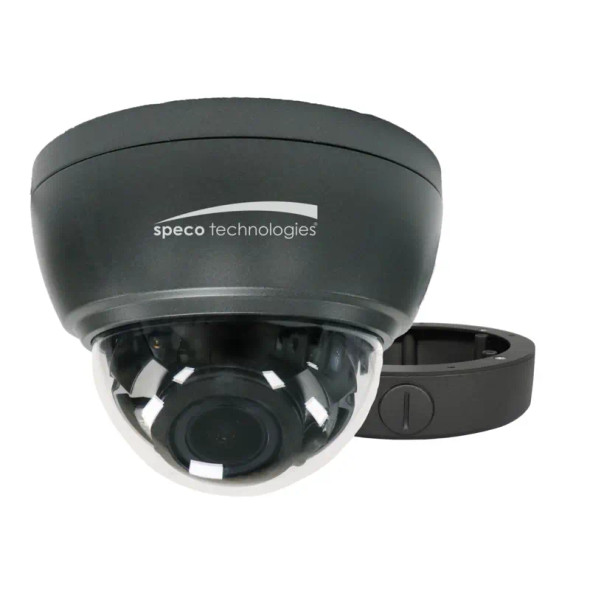
Speco HTINT59K1 1000TVL Outdoor Dome CCTV Analog Security Camera with Varifocal Lens
Brand: Speco
Part Number: HTINT59K1$582.30$251.25- Lens Type : Varifocal (Manual Zoom) Lens
- Sensor Size : 1/3" Sensor
- Protection Code : IP67
- Color : Black
- Environmental : Outdoor
$582.30$251.25 -
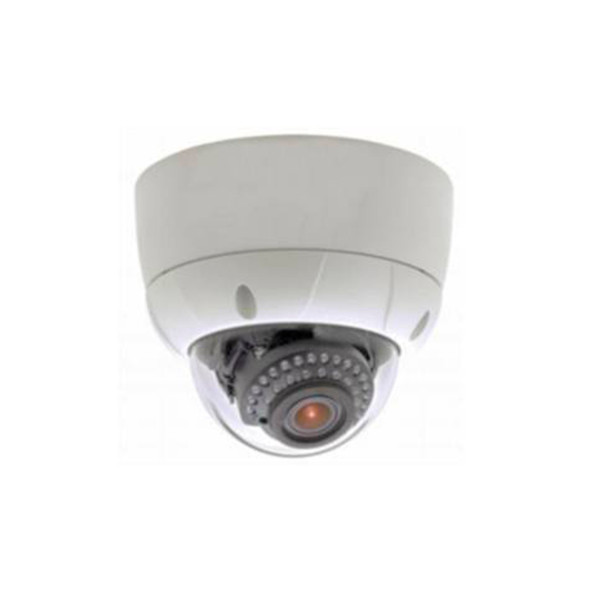
Ikegami ECO-D12-2812 750TVL Night Vision Outdoor Dome CCTV Analog Security Camera
Brand: Ikegami
Part Number: ECO-D12-2812$319.00- Lens Type : Varifocal (Manual Zoom) Lens
- Lens Size : 2.8~12mm Lens
- Sensor Type : CCD
- Protection Code : IP66
- Color : White
- Environmental : Outdoor
$319.00 -
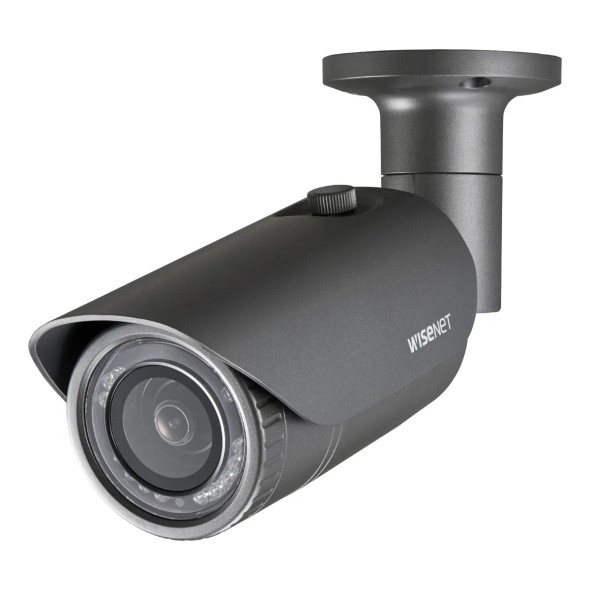
Hanwha Vision HCO-7030RA 4MP Outdoor Bullet QHD CCTV Security Camera
Brand: Hanwha Vision
Part Number: HCO-7030RA$200.00$164.78- Lens Size : 6mm Lens
- Sensor Type : CMOS
- Sensor Size : 1/3" Sensor
- Protection Code : IK10 IP66
- Material : Aluminum
- Aperture : F2.0
$200.00$164.78 -
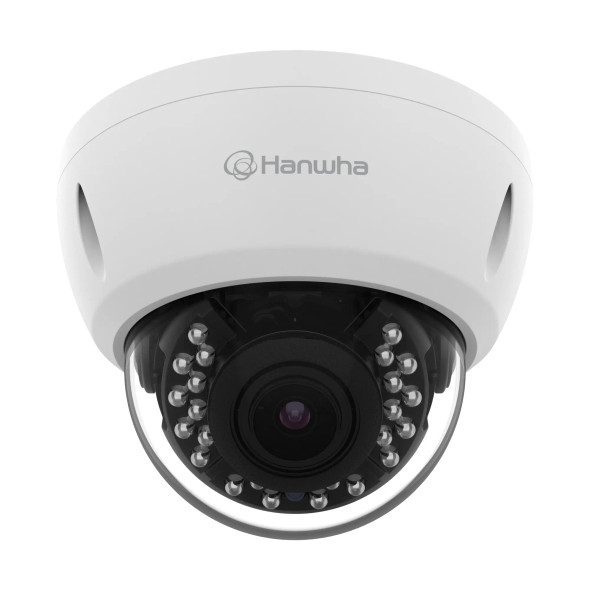
Hanwha Vision ACV-8080R 5MP Outdoor Dome Analog Security Camera
Brand: Hanwha Vision
Part Number: ACV-8080R$185.00$152.40- Lens Size : 4.3~10.5mm Lens
- Sensor Type : CMOS
- Sensor Size : 1/2.5" Sensor
- Protection Code : IK10 IP66
- Color : White
- Material : Aluminum
- Environmental : Outdoor
- Aperture : F1.6
$185.00$152.40 -

Honeywell HCCM674M 650TVL Indoor Box CCTV Analog Security Camera
Brand: Honeywell
Part Number: HCCM674M$770.00$487.82- Sensor Type : CCD
- Sensor Size : 1/3" Sensor
- Environmental : Indoor
$770.00$487.82 -
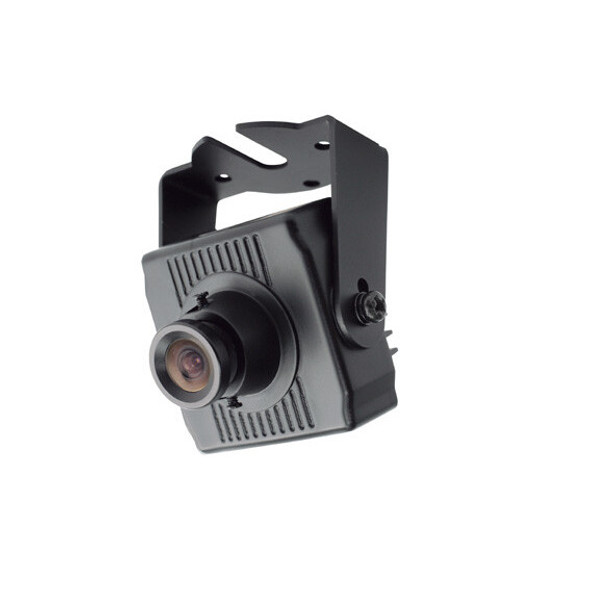
Ikegami ISD-A14S-25 525TVL Hyper-Dynamic Mini Cube CCTV Analog Security Camera - 2.5mm Fixed Lens
Brand: Ikegami
Part Number: ISD-A14S-25$325.00- Field of View (Horizontal) : 95°Field of View
- Lens Type : Fixed Lens
- Lens Size : 2.5mm Lens
- Sensor Type : CMOS
- Sensor Size : 1/3.2" Sensor
- Color : Black
- Environmental : Indoor
$325.00 -

Videotec UPT3NVWA000E 550TVL Outdoor PTZ Analog Security Camera with Wiper
Brand: Videotec
Part Number: UPT3NVWA000E$6,239.99- Sensor Size : 1/4" Sensor
- Protection Code : IP66
- Material : Aluminum
- Environmental : Outdoor
$6,239.99 -
New Product!

Arecont Vision CBC1K36W 850TVL Outdoor Mini Bullet CCTV Analog Security Camera with 3.6mm Lens
Brand: Arecont Vision
Part Number: CBC1K36W$201.40$145.75- Lens Type : Fixed Lens
- Lens Size : 3.6mm Lens
- Sensor Type : CMOS
- Sensor Size : 1/3.2" Sensor
- Protection Code : IP67
- Environmental : Outdoor
$201.40$145.75 -

Ikegami ISD-A15S 525TVL Hyper-Dynamic Compact Cube CCTV Analog Security Camera - No included lens
Brand: Ikegami
Part Number: ISD-A15S$348.00- Sensor Type : CMOS
- Sensor Size : 1/3" Sensor
- Color : Gray
- Environmental : Indoor
$348.00 -

Ikegami ICD-49 570TVL Super Cube DSP Monochrome CCTV Analog Security Camera - 1/2" CCD, No Lens included
Brand: Ikegami
Part Number: ICD-49$586.00- Lens Type : No Lens
- Sensor Type : CCD
- Sensor Size : 1/2" Sensor
- Color : White
- Environmental : Outdoor
$586.00 -

Ikegami ISD-A35S-31WH 525TVL Hyper Wide Light Dynamic Outdoor Dome CCTV Analog Security Camera
Brand: Ikegami
Part Number: ISD-A35S-31WH$435.00- Lens Type : Varifocal (Manual Zoom) Lens
- Lens Size : 2.8~11mm Lens
- Sensor Type : CMOS
- Sensor Size : 1/3.2" Sensor
- Protection Code : IP66
- Color : White
- Environmental : Outdoor
$435.00 -
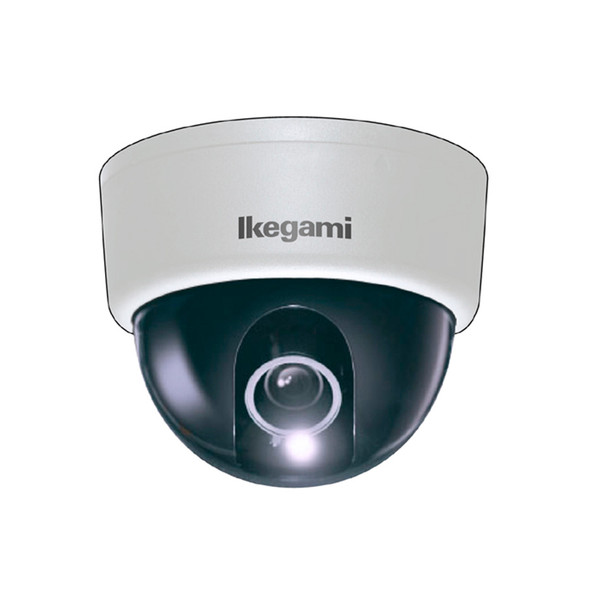
Ikegami ISD-A33-31WH 525TVL Hyper Wide Light Dynamic Dome CCTV Analog Security Camera
Brand: Ikegami
Part Number: ISD-A33-31WH$350.00- Lens Type : Varifocal (Manual Zoom) Lens
- Lens Size : 2.8~11mm Lens
- Sensor Type : CMOS
- Sensor Size : 1/3.2" Sensor
- Color : White
- Environmental : Indoor
$350.00 -
Discontinued

Speco HTSD28XH 700TVL 960H Outdoor PTZ CCTV Analog Security Camera
Brand: Speco
Part Number: HTSD28XH- Lens Type : Motorized (Automatic Zoom) Lens
- Lens Size : 3.5~98mm Lens
- Sensor Type : CCD
- Sensor Size : 1/4" Sensor
- Protection Code : IP66
- Color : White
- Environmental : Outdoor
-
Discontinued
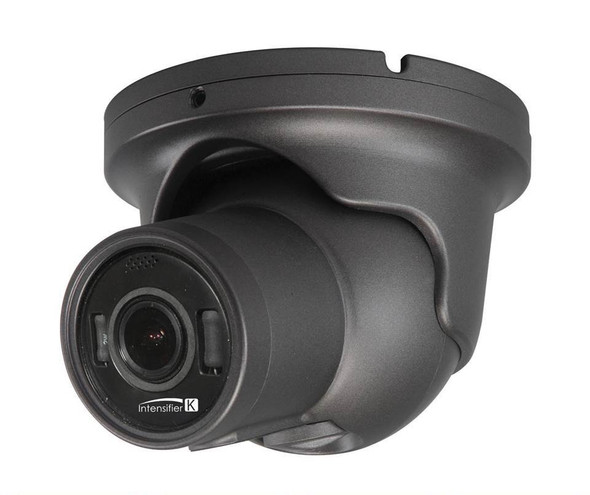
Speco HTINT60K 1000TVL Outdoor Turret CCTV Analog Security Camera with 2.8~12mm Varifocal Lens
Brand: Speco
Part Number: HTINT60K- Lens Type : Varifocal (Manual Zoom) Lens
- Lens Size : 2.8~12mm Lens
- Sensor Size : 1/3" Sensor
- Protection Code : IP67
- Environmental : Outdoor
